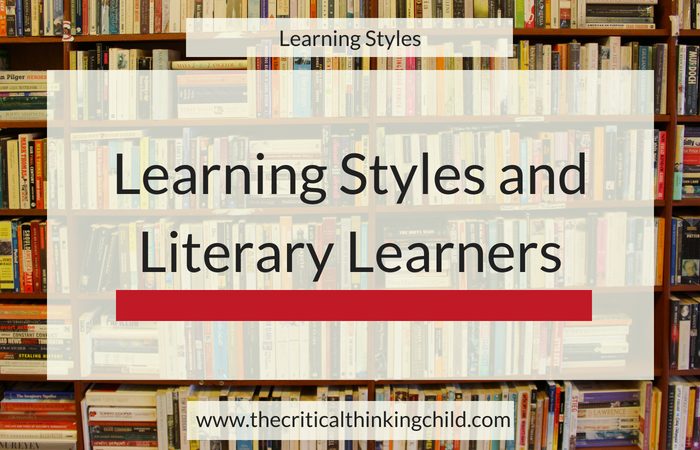Learning styles (also sometimes called learning preferences) have received a lot of attention over the years. That’s because knowing your learning style can help you understand, express, and remember information more naturally. This is a huge advantage for children who are in high stakes testing environments, or within gifted programs where the academic bar is high.
You may have heard learning styles traditionally broken down in categories like auditory, kinesthetic, and visual. But I like to break them into categories that look at how your child naturally reacts to their world. These categories are literary, active, analytical, and creative.
This post is the first in a series that provides an in-depth look at each learning preference, beginning with literary learners (for an overview of all the learning styles, click here).
Let’s dive in.
Who are literary learners?
Literary learners love words and stories. You can often find them surrounded by a pile of books, reading several at once. Literary learners are often also avid writers with big imaginations. They love to tell stories, are quick to use strong vocabulary and make up new narratives in their head.
In addition to their love for reading, literary learners also tend to be very organized and interested in making efficient systems, even from a very young age. You may find them creating rules for games or coming up with new systems for storing their toys. Following the more traditional terms for learning preferences, literary learners are often considered verbal or linguistic learners.
Strengths of literary learners
Literary learners usually learn to read quickly and easily and, as a result, develop large vocabularies. They also tend to be expressive writers who can have success in career fields like journalism, politics, and debate. Literary learners learn best when they can read the content, rather than only having it told to them verbally.
These learners typically demonstrate their understanding of new concepts by writing or speaking, rather than performing or showing. They tend to be independent learners with strong recall abilities, making memorization easier for them.
Because they are adept with words and excellent communicators, literary learners tend to get along well with others and work well in cooperative groups. Because of their large vocabularies and grasp of language, literary learners tend to do well on standardized tests.
Challenges faced by literary learners
Since literary learners learn best through reading, they may struggle in courses that are mostly lecture-based and do not have a paired power point or note-taking option, and may need information to be repeated several times when it is presented in lecture format.
Similarly, while literary learners work well in groups, they work best with written instructions. Group work where the roles of participants, the expectations, and the end products are not clearly laid out may be troublesome for literary learners.
Finally, while not always true, literary learners may be so strong in their verbal skills that they overly rely on this skill. This could lead them to struggle in other areas, usually mathematically or spatially. Try to be aware of whether your child os avoiding strengthening their mathematical and spatial skills in favor of the more comfortable literary skills.
How to help literary learners at home
Literary learners are independent and can keep themselves busy. That said, they will need encouragement and nurturing, especially in areas that come less naturally to them. Here are some fun ideas you can introduce to help nurture literary learners even more:
- If your child doesn’t already, encourage them to keep a journal of daily events. This will be a great way to practice writing skills and something fun for them to look back on when they are older!
- Involve literature whenever possible, especially in other domains such as math and science. If you’ve visited a science museum or a zoo, have your child pick an animal and write a story about that animal.
- Use cooperative learning to work on more difficult skills. If your literary learner struggles with math, pair him or her with a mathematical learner so they can both learn together.
- Have your literary learner write the next part of a story or TV show, or ask them to create an alternate ending.
- Have your child take on the perspective of another person, animal, or even inanimate object and write a story from that point of view!
Literary learners are fun, independent children. Be aware that they need to see information to understand it and be sure to include as many stories as possible at home, and your literary learner will soar!



